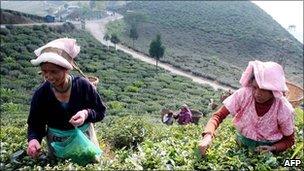Gorkha ethnic group in autonomy deal with India
- Published

The campaign has affected tea and tourism, mainstays of the Darjeeling economy
The most important Gorkha ethnic group in the Indian state of West Bengal has signed an agreement for greater autonomy with the government.
The Gorkha Janamukti Morcha (GJM) party has long campaigned for a separate state for Nepali-speaking Gorkhas in the tea-producing Darjeeling hills.
The GJM signed the deal with the Indian government and the government of West Bengal state.
Some other local ethnic groups, however, have opposed the deal.
Monday's deal paves the way for the setting up of a Gorkhaland Territorial Administration (GTA), an elected body for the Darjeeling hills.
Elections for the 50-member body, which will have powers to set up industries and create government jobs, will be held this year.
GJM leaders said the GTA was not a "compromise on its demand for a separate state and was, in fact, a step in that direction".
The groups opposed to the deal - including Amra Bangali, Jana Jagaran and Jana Chetana - held a 24-hour strike in the plains near the Darjeeling hill region to protest against the deal.
The Gorkha campaign for a separate state started in the early 1980s.
But a settlement that gave them considerable autonomy brought the movement to an end in 1988.
However, three years ago, the movement was resumed by Gorkha hardliners who believe the autonomy arrangement has not worked.